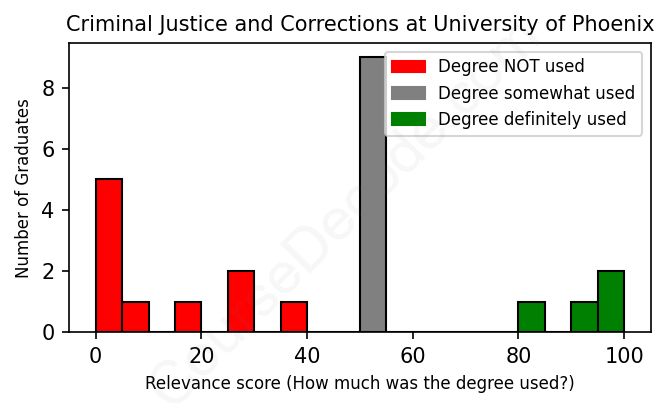
First, some facts. Of the Criminal Justice and Corrections graduates from University of Phoenix we've analyzed , here's how many have used (or NOT used) their degree in their career:

These are estimates based on AI analysis of 23 LinkedIn profiles (see below).
The verdict? Bad. Overall, with an average relevance score of 41%, Criminal Justice and Corrections graduates from University of Phoenix have a substantially lower likelihood (-26%) of finding work in this field compared to the average graduate across all fields:
And for comparison, here's the chart for all profiles we've looked at across all degrees.
Also, after graduating, only 21% of these graduates have pursued further education other than another Bachelor's degree (such as a Masters degree or other), compared to the average across all profiles of 35%. This suggests a Bachelors degree is enough for most Criminal Justice and Corrections graduates, and it's normal to look for work straight after graduation.
See the details:
|
Relevance score: 50% We think this person has gone into a career only somewhat relevant to their degree. We think this person has gone into a career only somewhat relevant to their degree.
DEGREE INFOGraduated in 2017 from University of Phoenix with a Bachelor of Science - BS in Criminal Justice and Corrections. No other secondary education since. JOB HISTORY SINCE GRADUATIONSupervisor Allied Universal Apr 2020 - Present ABOUTI have been working for the same company for over 16 years in the security department. I have obtained my associates degree in criminal justice and bachelor's degree in criminal justice administration management. |
The top 10 most common jobs done by the graduates we've analyzed (ranked most common to least) are:
When looking at the job outcomes for graduates with a degree in Criminal Justice and Corrections from the University of Phoenix, it's pretty clear that there's a mixed bag of relevance across various roles. Many graduates have landed jobs in fields like administrative support, customer service, and even sales, which don’t really use the specific skills or knowledge from their degree. For instance, working as a Credentialing and Case Management Support person or in something like a commission sales associate position doesn't directly apply the principles of criminal justice or corrections. Only a handful of roles, such as those in security, asset protection, or as a legal assistant, show a direct connection to the curriculum that these graduates studied.
On the flip side, there are definitely some noteworthy positions that align well with the degree. Roles in security and loss prevention, like Asset Protection Manager or Security Officer positions, heavily draw on the understanding of criminal behavior and enforcement strategies. Likewise, jobs such as Legal Assistant and roles at the U.S. Department of Defense require a solid grasp of criminal law and procedures, making them quite relevant. Overall, while some graduates are using their degree in meaningful ways, a significant number have moved into jobs that don't leverage their education in Criminal Justice and Corrections, which could be a bit disappointing for someone looking to build a career directly within that field.
Here is a visual representation of the most common words in job titles for Criminal Justice and Corrections graduates (this is across all Criminal Justice and Corrections graduates we've analyzed, not just those who went to University of Phoenix):

Based on the career paths of graduates from the University of Phoenix with degrees in Criminal Justice and Corrections, it seems like there’s a mixed bag. For many, their first jobs after graduation often relate to security, law enforcement, or administrative roles within organizations linked to public service, such as the U.S. government or healthcare. Some started out in positions like transport security or as administrative support, which are relevant to their field. However, it's also clear that for others, the initial jobs taken weren't directly aligned with criminal justice, leading them to roles in customer service or unrelated areas like real estate. This suggests that while some graduates found jobs in criminal justice-related fields right away, others veered off into different sectors from the get-go.
Looking five to ten years down the line, the trajectories continue to vary. While some have steadily climbed the ranks in fields related to their degree—like asset protection and law enforcement—many others have transitioned or remained in roles that don't directly pertain to criminal justice. For instance, a few have ended up in positions such as program management or even real estate, indicating a shift away from their original field of study. Others have stuck closer to their roots, moving up in roles connected to criminal justice, or transitioning into supporting positions within the legal or public sectors. In summary, the outcomes for these graduates are quite varied, with some finding fulfilling careers in criminal justice, while others have taken a broader path, discovering opportunities in diverse fields unrelated to their qualifications.
Getting a Bachelor’s degree in Criminal Justice and Corrections at University of Phoenix can be pretty manageable, especially if you're dedicated and keep up with your coursework. Overall, many students find that the curriculum is designed to be accessible, with a good mix of theory and practical concepts. While some classes might challenge you to think critically and engage with real-world cases, it tends to be a bit less rigorous than more technical degrees like engineering or sciences. So, if you stay organized, participate in discussions, and focus on your assignments, you should be able to handle it without too much stress. Just be ready to put in the effort, and you’ll likely find it a reasonable journey!
Most commonly, in the LinkedIn profiles we've looked at, it takes people 3 years to finish a Bachelor degree in Criminal Justice and Corrections.
Looking at the job histories of these Criminal Justice and Corrections graduates from the University of Phoenix, it seems like they've had a pretty mixed bag in terms of earnings. Some of them landed roles in government and management positions, like a Human Resources Specialist and Asset Protection Manager, which usually come with decent salaries and benefits. Others, though, started in entry-level roles like Customer Service and Security Officer positions that likely didn’t pay as well. Plus, a few are in more entrepreneurial or commission-based jobs, which can be hit or miss. Overall, while some are probably doing well financially, others might not be capitalizing on their degrees as effectively. It’s a journey, and it looks like some are still working their way up!
Here is a visual representation of the most common words seen in the "about" section of LinkedIn profiles who have a Bachelor degree in Criminal Justice and Corrections (this is across all Criminal Justice and Corrections graduates we've analyzed, not just those who went to University of Phoenix). This may or may not be useful:

Here are all colleges offering a Bachelor degree in Criminal Justice and Corrections (ordered by the average relevance score of their Criminal Justice and Corrections graduates, best to worst) where we have analyzed at least 10 of their graduates:
| College | Score | Count |
|---|---|---|
 American Military University American Military University
|
52 | 13 |
 Bridgewater State University Bridgewater State University
|
50 | 13 |
 University of Central Florida University of Central Florida
|
47 | 14 |
 University of North Texas University of North Texas
|
47 | 14 |
 University of Phoenix University of Phoenix
|
41 | 23 |
 University of Cincinnati University of Cincinnati
|
41 | 12 |
 Sam Houston State University Sam Houston State University
|
35 | 22 |
 John Jay College (CUNY) John Jay College (CUNY)
|
35 | 12 |
 Ferris State University Ferris State University
|
34 | 14 |
 Florida International University Florida International University
|
31 | 17 |
 Liberty University Liberty University
|
31 | 10 |
 California State University-Sacramento California State University-Sacramento
|
24 | 14 |
 Colorado Technical University Colorado Technical University
|
24 | 16 |